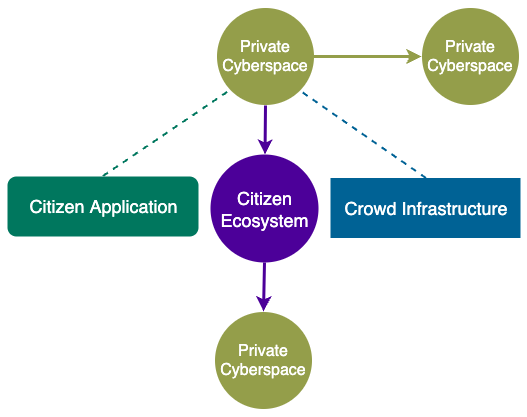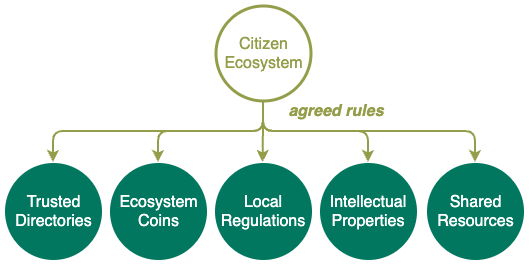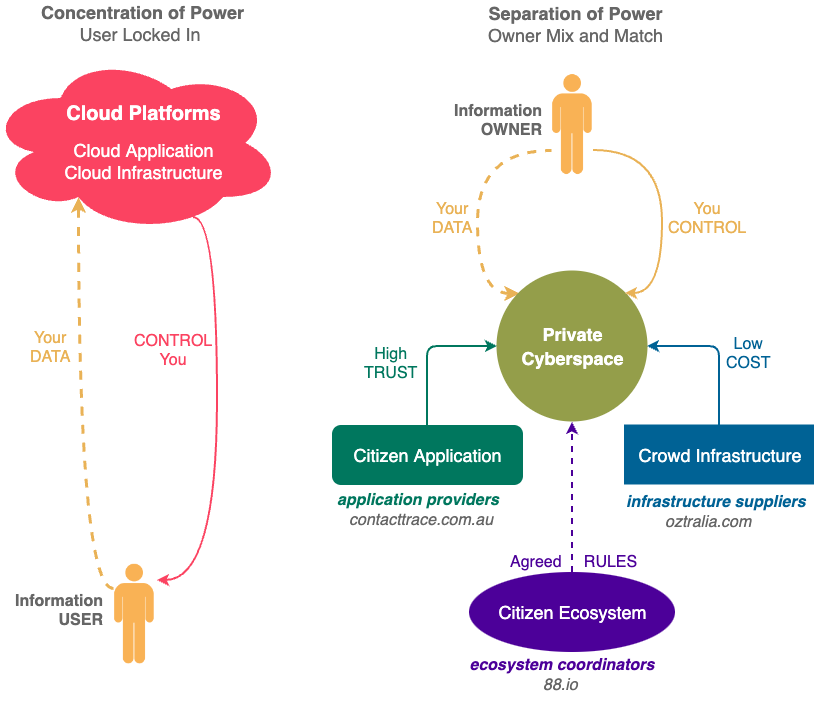1. Separation of Power
Although Private Cyberspaces can interact directly with each other at anytime under mutually agreed rules, Citizen Ecosystems provide ready made structures that Private Cyberspaces with common interests can join and interact with each other based on predefined rules of the ecosystem, WITHOUT needing to make individual interaction agreements with each other.

Common functions provided by the Citizen Ecosystem are:
- Maintain trusted directories.
- Issue ecosystem coins.
- Liaise with government departments.
- Protect intellectual property rights.
- Manage shared resources.

1.2. Joining and Leaving
Some Citizen Ecosystems, like country based national ecosystems are public and can be joined by anyone, while others are private and opened to certain Private Cyberspaces.
Besides joining existing Citizen Ecosystems, Private Cyberspaces can also work together and create a new Citizen Ecosystem for themselves.
Leaving Citizen Ecosystems is very easy, unlike Cloud Platforms, with Private Cyberspaces both the algorithms and storages are already on your infrastructure, there is NO need to export information NOR worry that your data has not been deleted.
1.3. Citizen Controlled
Citizen contributed and audited directories provides trusted sources of truth so Private Cyberspaces interact with Private Cyberspaces that they have no prior knowledge of or that they do not trust.
Besides standard updating and reading operations on the directories, these directories also support monitoring and auditing by ANY member - even members without much computing resources.
2. National Ecosystems
There is normally at least one Citizen Ecosystems for each country to ensure that interactions between Private Cyberspaces follow the law of that country.
Due to the separation of power principle, the global citizen ecosystem 88.io CANNOT operate as a National Ecosystem in any country. It can help start other ecosystems and it may act as a back up in rare cases, but it was never designed to be the primary ecosystem for everyday use.
Currently, 3 trial national citizen ecosystems are being developed in 3 countries:
- net2max.au - Australia
- net2max.cn - China
- net2max.us - United States of America
These are trials ecosystems for fine tuning of the ecosystem deployment process, it is expected that local citizens will deployment ecosystems in those countries themselves for production use by the public.
Some government departments and large enterprises are also expected to deploy their own ecosystems for sovereignty and security reasons.
Due to the separation of power principle, within each public ecosystems (where users do not belong to the same organisation) each legal entity can only be ONE of ecosystem coordinator, application provider or infrastructure supplier.
2. Separation of Powers
Power tends to corrupt and
absolute power corrupts absolutely.
Lord Acton
To prevent those WITH massive compute power shaping the lives of those WITHOUT, Private Cyberspace breaks up monolithic Cloud Platforms into millions of independently owned and controlled digital environments to deliver unprecedented privacy, security, performance, and reliability.
Private Cyberspace breaks the monolithic Cloud structure into 3 independent branches preventing control of your cyberspace by a single party.
- Crowd Infrastructure provides affordable infrastructures to your cyberspace by using surplus resources in other private cyberspaces.
- Citizen Application provides trusted applications to your cyberspace by using other cyberspaces to execute and monitor their operations.
- Citizen Ecosystem provides coordination between cyberspaces so they can interact according to agreed rules.
Citizen Ecosystem is optional in most interactions, when Private Cyberspaces already know about each other ad are happy to deal directly with each other.
A loose analogy can be made between the 3 branches of the Private Cyberspace with the 3 branches of governments. The fundamental difference is that the owner of the Private Cyberspace CONTROLS ALL 3 branches.
- Crowd Infrastructure - Executive branch
Owners of Private Cyberspaces can select the Crowd Infrastructures to perform the actual operations on its data. - Citizen Application - Judiciary branch
Owners of Private Cyberspaces can select the Citizen Applications to decide on which operations to performed on its data. - Citizen Ecosystem - Legislature branch
Private Cyberspaces can belong to none, one or more Citizen Ecosystems and can freely change them.
In Australia the developers of those 3 branches are 3 separate businesses under 3 different legal entities (companies):
| Branch | Support | Business Name | Company Number |
|---|---|---|---|
| Crowd Infrastructure | Infrastructure Supplier | OZtralia | ABN 62 629 769 919 |
| Citizen Application | Application Provider | Contact Trace Australia | ABN 72 052 359 725 |
| Citizen Ecosystem | Ecosystem Coordinator | net2max.au | ABN 58 091 880 330 |
The separation of power principle does not stop at just the developers, it is applies to every component and operation related to Private Cyberspaces. So long as the separation does not affect the quality of the system negatively by too much - the responsibility is divided between more parties.
